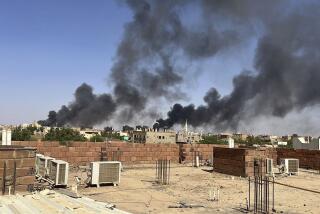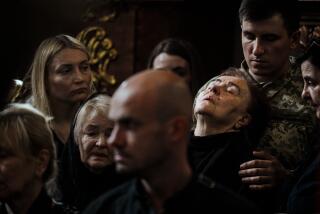Poles Find Mass Grave, Suspect Wartime Atrocity
- Share via
WARSAW — A mass grave discovered in a pine forest eight miles from the Soviet border is being investigated by the Polish war crimes commission, officials here said Wednesday.
Residents of the town of Giby in northeastern Poland believe that the grave may contain the remains of 200 to 500 area residents who, they believe, were rounded up and killed by Soviet soldiers at the end of World War II.
Polish officials stressed, however, that the identity of the victims, or how they were killed, must await a full investigation. Looking at another possibility, they noted that the bodies could be those of Soviet soldiers killed by the retreating German army in 1945.
However, most area residents seem convinced that the victims died at the hands of Red Army soldiers, who swept through the area and rounded up hundreds of local residents in the weeks after the close of the war in May, 1945. Some of those who disappeared were believed to have been deported to the Soviet Union, but this could never be confirmed.
The grave was found June 29 by a local farmer, Stefan Meszczynski, who said he believes that three of his brothers are buried there. The blackened human bones were found under about three feet of soil.
Confirmation that the victims died at the hands of the Red Army would be highly embarrassing for the Polish government in view of its close ties to the Soviet Union.
Atrocities connected with the Soviet army’s wartime activities in Poland are seldom mentioned here officially. An example is the Katyn Forest massacre of more than 4,000 Polish army officers, prisoners of war captured by the Soviets in their joint invasion of Poland with the Nazis in 1939. The Soviets blamed the German army for the deaths but are generally believed to have been responsible themselves. The incident is regarded as a blank area, or “white spot” as it is called, in official Soviet-Polish history.
Poland’s Communist leader, Wojciech Jaruzelski, and Soviet leader Mikhail S. Gorbachev declared after a meeting in Moscow last April that in the future “all episodes (of history), including dramatic ones, must receive an objective and clear interpretation.” The investigation of the grave site could test that promise.
Many mass graves have been discovered in Poland since the war, a continuing reminder of the immense suffering inflicted on the Poles in that conflict. Poland lost 6 million people in the war, or 18% of its population.
More to Read
Sign up for Essential California
The most important California stories and recommendations in your inbox every morning.
You may occasionally receive promotional content from the Los Angeles Times.










